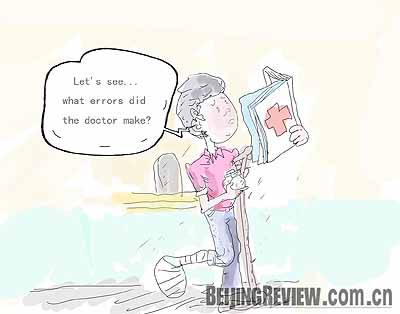|

Rigorous debates have followed the formulation of a new law that changes the way Chinese courts handle medical disputes. The draft Tort Liability Law, which is being deliberated by the National People's Congress (NPC), China's top legislature, deals with when a person/organization can be sued for work-related conduct or events. An article in the law stipulates that patients who believe they have been badly treated by medical personnel must supply proof of this if they ask to be compensated. Presently, courts require medical staff to prove that any medical accidents are not of their doing.
The new law received divergent responses from both sides of the aisle. Although some supporters believe the new law will help reduce unnecessary medical costs, since hospitals can carry out less treatment on patients to prove they are not responsible for medical accidents, most patients worried that it could be harder for them to claim compensation due to lack of professional medical knowledge.
Some medical industry insiders have long accused the current system of reversed burden of proof, implemented in 2002, of driving medical costs higher as a result of "defensive treatment" by doctors, such as extra physical tests or larger-than-necessary drug dosages, to ensure the safety of patients. On the other hand, doctors tend to be more conservative rather than creative with options of treatment available, they say.
Opponents of the new law, however, argue that medical institutions have easier access to evidence in view of medical records kept and formal procedures on medical disputes.
Legal experts note that the majority of medical disputes are not caused by the reversed burden of proof but the mistrustful and suspicious relationship between medical staff and patients. The priority therefore is to improve medical service to restore patients' confidence in medical workers, they suggest.
Hospitals in dilemma
Dao Ke (New Express): We worry that patients will carry the burden of proof, but cannot easily identify what a doctor has done wrong. In previous laws, doctors were assumed to be guilty, and would provide evidence to prove their innocence when disputes arose.
In fact, in a rule also implemented in 2002, patients have actually been entitled to obtain duplicate copies of medical records, including laboratory results, audio or video records of routine examinations and preoperative and postoperative data to fully guarantee their right to know.
Since doctors carry the burden of proof, their freedom of creativity is to some extent restrained, and thus hampering the development of medical sciences. Doctors will rigidly follow diagnostic procedures to prevent any possible irregularity. "Defensive treatment" is popular to avoid possible risks, but may delay the process of treatment. Although the burden of proof has been transferred to hospitals, it also adds extra financial burdens to patients as a result of unnecessary body examinations to reduce uncertainties.
Yan Yang (www.jschina.com.cn): Despite its advantages to patients, the previous rule has resulted in widespread overcautious treatment. Without prior consent from the patient, or their accompanying relatives, doctors won't take action for fear of accountability.
Actually it is not that easy for medical staff to clarify themselves either. Doctors will have to track down specific patients, or even keep video records of every surgery for later evidence, which will lead to higher management costs.
Meanwhile, it may provide an excuse for a few profit-seeking hospitals to randomly increase items of treatment, infringing upon patients' interests as well.
Wang Lin (Guangzhou Daily): Under the basic rule of legal relief, victims should provide proof, while the reversed burden of proof is applied only in cases where prosecutors have no firsthand evidence or accusers are obliged to prove themselves innocent. Take the crime of possessing a huge amount of property with suspect resources for example. If the suspects fail to prove they acquired the property legitimately, they are assumed to be guilty of corruption or embezzlement.
| 